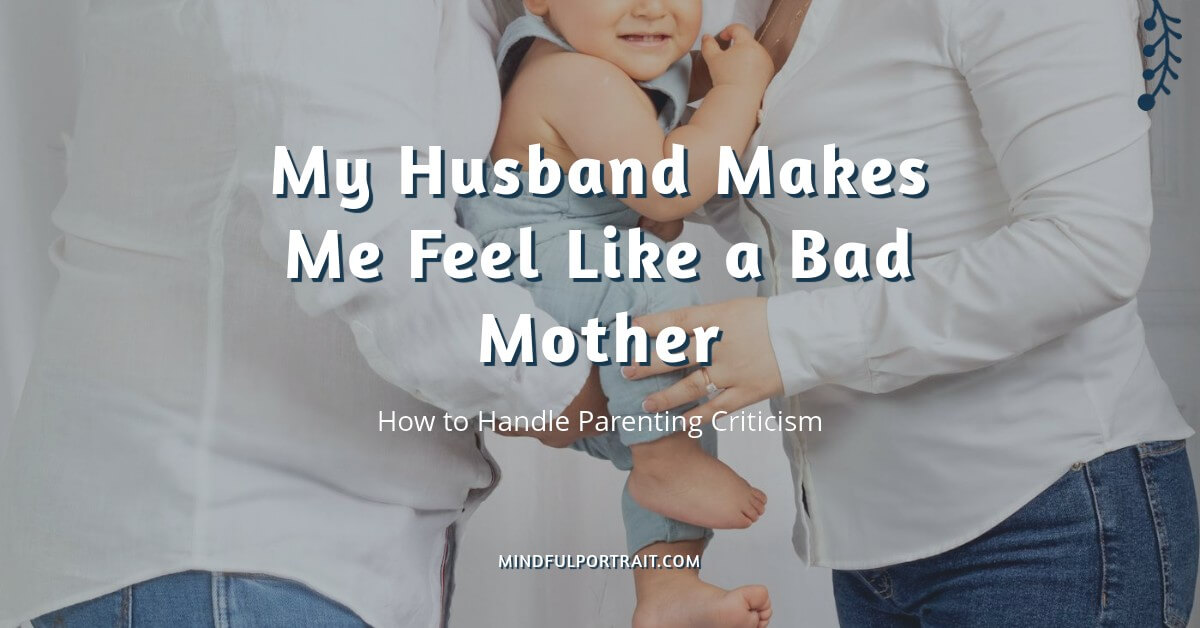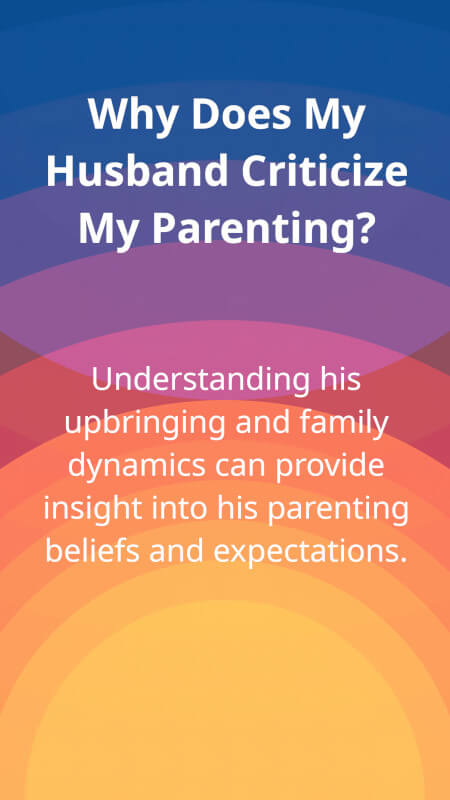“My husband makes me feel like a bad mother. Every time my husband criticizes my parenting, I feel like a complete failure and start hating myself and my family.”
These are the words of a mother who battled with her own mental health for years and still chose to stay silent, fake happiness, and lead an Instagram-perfect family life. This is a common issue that needs to be addressed and resolved.
Have you ever felt like you’re doing your best, yet nothing is good enough? There are ways to find strength and regain your confidence as a mother, even in the face of criticism.
Why Does My Husband Criticize My Parenting?
- His Family Background and Childhood: Knowing more about his childhood and family dynamics, or the way he was brought up, can be really helpful. These factors can highly influence one’s parenting styles and beliefs. Thus, discussing these things can help you understand each other and sort out the problems with mutual respect.
- Personality: Everyone has their own unique personality with different values, moral beliefs, preferences, opinions, principles, and more. Factors such as exposure, lifestyle, and upbringing can all impact each person’s perspective on life. Thus, there may be instances where there is no clear right or wrong, but rather that everyone is right according to their own viewpoint.
- Emotional Development: Emotional maturity determines a person’s ability to understand the emotions of others, including their child and partner. This can significantly affect their viewpoints. A lack of empathy or an inability to understand the reasons behind a child’s particular behavior can impact his judgments.
- Outside Influences & Comparisons: It can be anyone from close circles, like his mother, to a random mom and child he saw during travel. There are more chances that he gets manipulated and confused about your parenting decisions. He might start comparing your child to his colleague’s child, their parenting approaches, and take unsolicited advice seriously.
- Stress Management: Some men struggle with stress management and eventually end up damaging their relationships by venting their anger, frustration, and other emotions onto you.
- Lack of Awareness: Often, a lack of awareness can lead a parent to stick to outdated parenting styles, follow harmful parenting trends, or make mistakes out of ignorance.
“My Husband Makes me feel like a Bad Mother” :Common Examples
- Feeding Choices: Judgments regarding breast milk quantity for breastfeeding mothers and the questioning of capabilities, hurting or shaming formula-feeding mothers.
- Overprotective Moms: Sometimes, terms like “overprotective mom” or “helicopter mom” are misused, and involved or caring moms are unfairly labeled by those around them. Are you an overprotective mom? Discover the signs, causes, and tips to manage overprotective tendencies.
- Parenting Styles: Couples disagreeing over parenting styles is common. The most common scenarios involve gentle parenting vs. strict parenting. But when there is a sense of superiority, along with a lack of trust and respect, they hurt their partner, destroying their self-esteem, mental health, and love.
- Career Choices: There is no distinction between the stay-at-home mom and working mom in terms of criticism. While SAHMs are criticized for financial issues and efficiency, working moms are considered selfish.
- Child’s Behavior: Even if a child makes a silly mistake, it’s attributed to the mother’s upbringing. Many times, mothers have to manage the stress of toddler tantrums and judgments for it all alone.
- Academic / Achievements: All shortcomings in terms of health, academic performance, and social life are considered the mother’s responsibility.
- Asking for Help: Asking for help or not being perfect is considered an incapability of the woman. A mother is expected to take care of her child, manage the household, and handle many other responsibilities alone, without complaints or seeking validation.
Effects of Parenting Criticism from the Partner
- For Kids: Kids need to see their parents work as a team. When they witness their parents disagree on parenting decisions, it negatively influences their character formation, confidence, discipline, and family bonding.
- Mother’s Self-Esteem & Mental Health: When the husband constantly criticizes her parenting, she may slowly start to doubt her capabilities or struggle with mental health for not being able to make her partner understand her viewpoint. This can also lead to “Mom Guilt,” and if not managed properly, can significantly impact her quality of life. Learn more about Mom Guilt, Causes, Examples, and Overcoming Tips here.
- Family Dynamics and Bonding: Different parenting styles ruining the marriage have become very common. When partners disagree about their parenting approach, their relationship may slowly fall apart, or one partner may choose to remain passive and suffer in silence. Many times, they see their partner in a different light only after having kids, and many relationships end up losing their spark, leading to loveless marriages that survive solely for the sake of the kids. This is especially common when one partner feels undervalued, constantly criticized, and mistrusted regarding their abilities, which can lead to frustration, frequent fights, or silent treatments.
How to Handle it When Your Husband Makes You Feel Like a Bad Mother
- Processing Your Thoughts: Journaling is a great way to process your thoughts, emotions, and experiences. You can add a page with the title, “My husband makes me feel like a bad mother,” and outline the circumstances leading to those feelings along with ways to cope. This can help you feel much better when you feel suffocated by your husband’s criticism of your parenting and are confused about how to deal with it.
- Learn to Communicate the Right Way: When your husband criticizes your parenting, it’s time to start open discussions. The most important thing to note is learning how to communicate properly. Only you know your partner; think about how he might react to criticism. Does he validate your emotions, or does he tend to become defensive and end up hurting you again? Consider all these factors and express your feelings with him. He needs to know that you are affected by his criticism and understand parenting from your point of view, including your intentions and actions. Similarly, make sure you listen to his perspectives as well.
- Partners Disagreeing Over Parenting Is Very Common: Realizing that differences are common can help you find ways to deal with them. You may have married someone with an opposite personality, or you might be similar in many ways but have different parenting beliefs, which you are only now realizing. It’s also possible that these disagreements stem from tiredness, confusion, and the stress of the new phase you are both experiencing. Open communication and a few minor adjustments can often resolve these issues.
- Educate Yourself: Update your knowledge. Read a lot and gather helpful information about parenting from reliable and trustworthy sources. This can help you increase your self-esteem and improve yourself. Your confidence will be reflected in your parenting, which can either make your husband rethink when he criticizes you the next time or help you feel unaffected by his comments.
- Make Your Own Tribe: Keep genuine friends outside your marriage, especially like-minded fellow mothers. They can provide you with irreplaceable emotional support and share tips from their own experiences.
- Self-Care: Self-care is much needed, especially when you feel like a bad mother. You need to love yourself and care for your well-being. A happy, confident, and healthy mother can raise a better generation. Self-care can help you unwind, recharge, and start fresh.
- Constructive Criticism vs. Misunderstandings: It’s completely normal to feel offended and defensive when you face constant criticism from your husband. But it’s equally important to realize that parenting is a learning process; making mistakes and learning from them is a normal part of healthy parenting. Take time for self-reflection and improvement as a mother. Being open to constructive criticism doesn’t mean that you need to compromise your self-respect. Learn to differentiate between constructive criticism, unnecessary judgments, and blaming.
- Seek Help: You should not involve a third person in your relationship issues. But what if you both cannot solve this on your own? Try to get support from communities, forums, or trustworthy friends. You can consider clearing your doubts that arose from the criticism that makes you feel like a bad mother with them. If you find this phase is ruining your mental peace or your family dynamics, it’s worth considering seeking therapy.
Reflections from Mindful Portrait

Most of the time, partners never discuss their parental expectations and beliefs beforehand. This is the main reason issues regarding parental differences are increasing now. There are cases in which partners have already discussed these topics but see a completely different person once one becomes a parent. This is also normal, as parenting is never an easy task. Even though this phase is challenging, partners should learn to deal with it with mutual respect and stop constantly criticizing each other’s parenting.
Next time when you feel like, “My husband makes me feel like a bad mother,” understand that he can only make you feel that way but cannot make you a bad mother. Counter the criticism. Make sure partners are there to support each other, validate each other’s efforts, and only then will parenting feel fulfilling.


